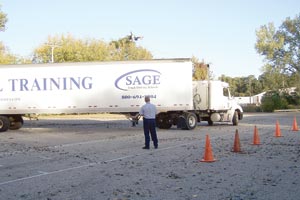Driver Training Officials Decry New CDL Regulations

Driver training school operators and fleet executives said new federal regulations are increasing the cost of training and making it more difficult for people to obtain commercial driver licenses.
The rules, years in the making before finally taking effect in July, are aimed at stamping out fraud by requiring more oversight of testing procedures, including background checks for test examiners, proof of residency for applicants and a prohibition against using interpreters for knowledge and skill tests.
The rules also establish minimum standards for issuance of learner’s permits and direct state agencies to use an electronic database to monitor and report test results.
“This rule has made it harder and more costly for us to recruit new entrants to the industry,” said T.J. England, general counsel for C.R. England Inc., a refrigerated truckload carrier based in Salt Lake City that provides training at four locations. England said a rule requiring students to get learner’s permits in their home state is making it difficult to complete training in a timely manner and creates a financial hardship.
“We’ve seen a decline in class sizes because of increases in the regulatory burden,” England said.
Other officials said a rule requiring applicants to wait 14 days after receiving a permit to take a skills test has exacerbated delays and is leading to a decrease in the number of applicants who are able to pass. As a result, some are choosing to give up.
“Our pass rate has gone down,” said Cameron Holzer, president of CRST Expedited and head of the company’s North American Driver Training Academy in Cedar Rapids, Iowa. “Drivers get discouraged, and they leave the program.”
Holzer said CRST has added four instructors and has extended its training program by three days, boosting training costs by 20%.
“Many states simply don’t have the capacity to make changes to their CDL testing programs quickly,” said Christopher Thropp, vice president of the Sage Corp. that operates 25 driver training schools. “Some states don’t have enough examiners, and it’s getting worse.”
The delays require schools to conduct retraining, and they create frustration for applicants who can’t get paid until they get a license.
John Kearney Sr., president of Roadmaster Drivers School in Tampa, Florida, said he would like to see a change in the rule that requires applicants who fail a skills test to wait two days to test again.
Roadmaster operates 13 schools and was one of two training schools recently acquired by Werner Enterprises, an Omaha, Nebraska-based truckload carrier.
Don Lefeve, CEO of the Commercial Vehicle Training Association, said the trade group would like to see greater use of third parties to help alleviate testing delays.
“Currently, 15 states are facing delay times of 14 days or longer, eight of which are 21 days or longer,” he said. “We have carriers who need drivers, yet many states are not dedicating the resources to hire more examiners, add new testing locations or expand third-party testing, which is exacerbating the driver shortage.”
Sean Garney, director of safety policy at American Trucking Associations, said the industry supports many of the tougher testing requirements, but fleets would like to see a change to allow states to issue permits to individuals attending training programs in other states.
Bill Quade, associate administrator for enforcement and program delivery for the Federal Motor Carrier Safety Administration, said the issue of obtaining a learner’s permit outside of a driver’s home state did not come up in the discussions leading to the final rule.
“We’re looking at whether we can adjust the regulations,” Quade said.
He said he believes the regulations are working “for the most part” and the agency is working with states to reduce delays and “come into compliance” with systems to improve the exchange of data.
Most states are using a Web-based tool called the Commercial Skills Test Information Management System to track scheduling and test results, while others have developed comparable systems.
“It seems to be working,” he said.

